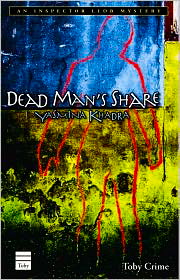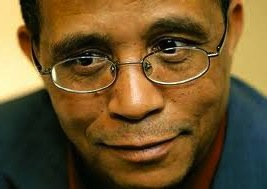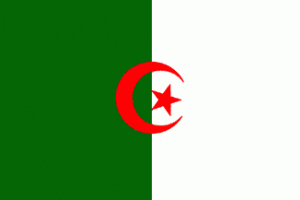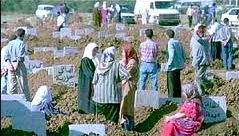“El Bahja [Algiers] is sick…Everywhere, slovenly cops harass their people, except when there’s a riot and immense crowds gather in public places…The fundamentalists are inching ahead, good people are pulling down walls and the young are seeking the terrible darkness of despair in shadowy doorways.”
Set in 1988, twenty-five years after Algeria’s independence from France, the country is still suffering from political instability, corruption, and the residual rivalries and hatreds between those who supported French rule during the war and the FLN and other groups, socialist and otherwise, which fought against French rule. The internecine rivalries and hatreds among a multitude of these local groups, many of which shared the same general goals during the war, have divided families and continued into the next generation with even more bloodshed. The devastated economy at the end of the war has not been improved, people are living in poverty, religious fundamentalism is growing, the young have no future, and citizens everywhere are casting jaded eyes on those who reek of success—shady businessmen, corrupt politicians, and those who have achieved their wealth at the expense of their fellow citizens.
1988, twenty-five years after Algeria’s independence from France, the country is still suffering from political instability, corruption, and the residual rivalries and hatreds between those who supported French rule during the war and the FLN and other groups, socialist and otherwise, which fought against French rule. The internecine rivalries and hatreds among a multitude of these local groups, many of which shared the same general goals during the war, have divided families and continued into the next generation with even more bloodshed. The devastated economy at the end of the war has not been improved, people are living in poverty, religious fundamentalism is growing, the young have no future, and citizens everywhere are casting jaded eyes on those who reek of success—shady businessmen, corrupt politicians, and those who have achieved their wealth at the expense of their fellow citizens.
In this newest installment of the Inspector Llob series, chronologically the “pre-quel” to the series, author Yasmina Khadra turns a spotlight on Algeria’s devastated country and its demoralized citizens. Khadra, who admitted his real identity in 2001, is, in reality, Mohammed Moulessehoul, an Algerian army officer/writer who escaped censorship by seeking refug e in France in 2000, where he has lived in seclusion ever since. His main character, Superintendent Llob, is also a writer—an honest police official who does not compromise. Smart-mouthed, with a cynical sense of humor and an understanding of the ironies of everyday life, Llob manages to stay afloat in the murky waters of Algerian bureaucracy, supported by Mina, his loving wife. His assistant, Lieutenant Lino, is completely ineffective as this novel opens. He has fallen in love with a gorgeous woman, and as a result, he is spending lavishly on his clothes and appearance, going to restaurants he cannot afford, calling in sick when he is at his fittest, and creating disturbances while drunk and disorderly.
e in France in 2000, where he has lived in seclusion ever since. His main character, Superintendent Llob, is also a writer—an honest police official who does not compromise. Smart-mouthed, with a cynical sense of humor and an understanding of the ironies of everyday life, Llob manages to stay afloat in the murky waters of Algerian bureaucracy, supported by Mina, his loving wife. His assistant, Lieutenant Lino, is completely ineffective as this novel opens. He has fallen in love with a gorgeous woman, and as a result, he is spending lavishly on his clothes and appearance, going to restaurants he cannot afford, calling in sick when he is at his fittest, and creating disturbances while drunk and disorderly.
Llob wants to help Lino, but even he becomes impatient when Lino’s excesses come to the attention of the powers that be and start to affect Llob’s own job. In the meantime, SNP (for “sans nom patronymique,” meaning “no family name”), a serial killer, has received a presidential pardon and is about to be released after spending seven years in an asylum and additional years in jail. Llob is horrified, especially when he hears tapes of SNP declaring: “I kill to understand. And I’ll go on killing as  long as I don’t understand what pushes a human being to excel in the art of lavishing the most excruciating torments on his fellow men.” Llob cannot stop the release since an influential a member of the Political Bureau, has signed the papers. The unusual calm which has permeated Algiers for the past several weeks changes.
long as I don’t understand what pushes a human being to excel in the art of lavishing the most excruciating torments on his fellow men.” Llob cannot stop the release since an influential a member of the Political Bureau, has signed the papers. The unusual calm which has permeated Algiers for the past several weeks changes.
In Part II, Lino is back at work, temporarily, but when the chauffeur of a wealthy and influential man is shot to death and the gun used matches Lino’s gun, Lino is arrested, sent to a hellish dungeon, and kept incommunicado, even from Llob. Another murder sends Llob into the hinterlands with journalist/history professor Soria Karadach, a researcher studying events from August 1962, immediately following the end of the war, especially in Sidi Ba, a small town in which a massacre occurred. There Llob meets with harkis (Muslim Algerians who worked with the French), maquisards (rural guerrillas who worked with the French Resistance), mujahids, and people claiming to be members of the FLN, socialist freedom-fighters. None of these people trust any of the others to remember “correctly” what happened in the town, but gradually, the past of one of Algeria’s most famous citizens begins to emerge.

Eventually, the events of Sidi Ba and the arrest of Lino converge, and though the details of the plot are extremely complex, the novel is carefully constructed, and the mystery is fully resolved. Khadra is an accomplished novelist who creates fully-developed characters, endowing them with deeply human failings and giving them a kind of dark humor which allows them to survive the violence and irrationality they face every day in Algiers. The betrayals of individuals by each other, of citizens by their leaders, of the law by police, of innocent victims by the judicial system–all contribute to the darkest of noir fiction and a vision of Algiers which makes one want to weep for the victims.
Notes: According to Wiki: “In 2004, Newsweek acclaimed [the author] as “one of the rare writers capable of giving a meaning to the violence in Algeria today.” http://en.wikipedia.org
His photo is from http://penatlas.org
The flag of the FLN (National Liberation Front, a socialist organization) during the Algerian Civil War appears on http://flagspot.net
Mourning the victims of the continuing Algerian violence: http://news.bbc.co.uk
